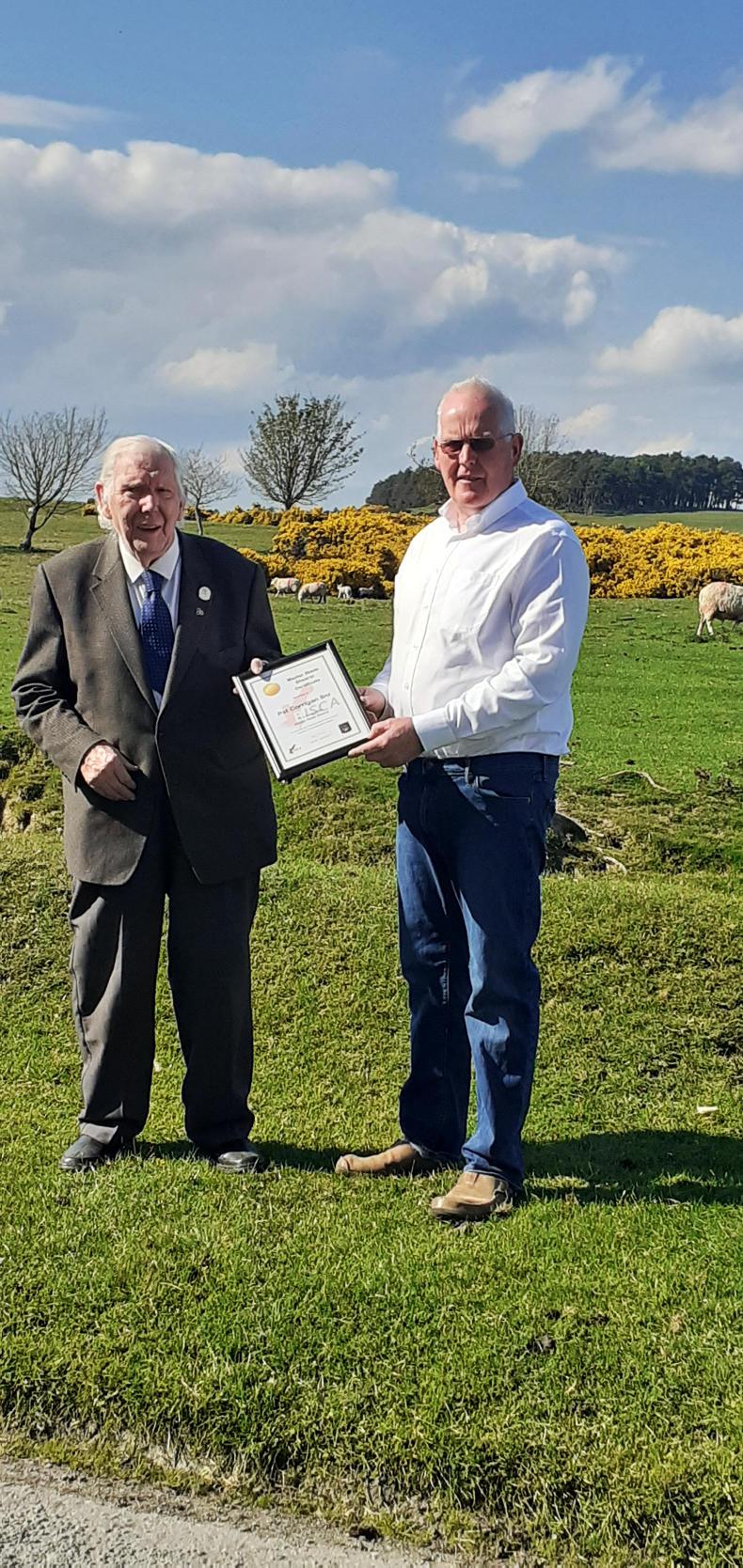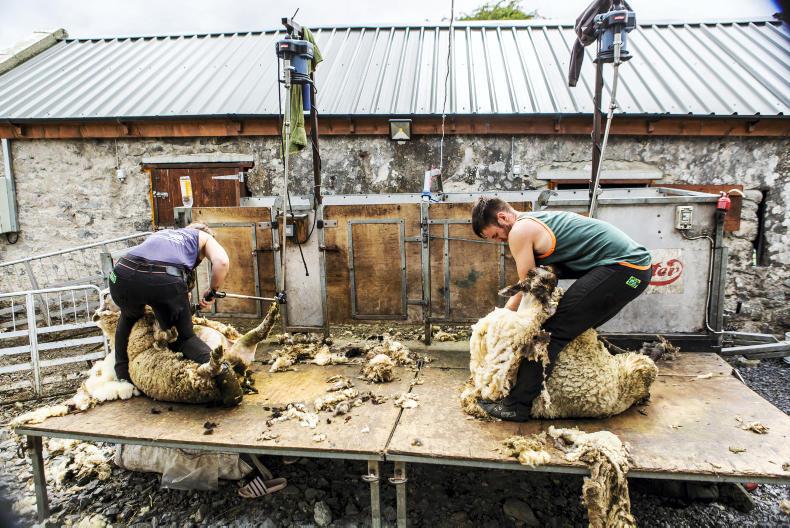This year’s shearing season is taking place in challenging circumstances. Shearing is an animal welfare concern and, as such, is deemed an essential service with regard to coronavirus restrictions. Just because it is classed as an essential service does not mean that vital precautions can be overlooked in the fight to prevent the virus from spreading.
Sheep farmers have one of the oldest age profiles of any sector and there is a high number of farmers in a high-risk category grouping.
Shearers and farmers both have a duty of care to themselves and each other
These farmers should make alternative arrangements so that they are not required to be present when shearing.
Shearers and farmers both have a duty of care to themselves and each other. Shearers need to be in a position to provide a service that limits risks when coming onto a farm.
This ranges from shearing with the use of a shearing trailer to alternative options such as being in a position to work from a race or pen adjacent to where shearing is taking place to eliminate any contact and maintain a distance of at least 2m apart.
The following is a recap of 10 of the most important recommendations recently released by the National Association of Agricultural Contractors (NAAC) in the UK and endorsed by the Irish Sheep Shearers Association.
The initial contact between the farmer and shearing contractor should clearly set out a plan for how work will be carried out and how social distancing will be maintained. Farmers should be ready for the task in hand and carry out appropriate practices such as fasting of sheep before shearing, separating ewes and lambs, dagging dirty sheep, etc, so that sheep are in prime condition and delays are minimised. Any person presenting with any symptoms of coronavirus must not be present at shearing. A minimum distance of 2m must be adhered to at all times unless it is vital to work safely. If so, then HSE guidelines should be followed regarding working in close confines. Handwashing facilities/hand sanitiser must be available and hand-washing guidelines followed. Agree at the outset what is expected of each other. Shearing should not be viewed as an attraction this year and visitors and children should be excluded from entering the area where shearing is taking place. Shearers and farmers must be responsible for putting up their own equipment and cleaning and disinfecting following use. Try to maintain separate working areas. Any shared areas that are touched should be cleaned thoroughly and disinfected.The shearer can kick the wool off the board or the wool handler can use a brush with a long handle to maintain a distance of 2m to handle and pack wool. Disinfect shearing equipment between farms. Change clothing and moccasins before moving to the next farm and bag clothes for washing before wearing again. Work together to overcome any issues. Shearers are likely to be under more pressure this season while everyone involved will be more concerned about the risks faced.
There is no sign of any immediate recovery in the wool market with prices quoted still in the region of 15c/kg to 20c/kg for lowland wool, while grey Scotch wool is not being given a value.
Wool merchants continue to offer to take wool into their premises for processing and storage, with the sale value finalised at a later date.
It looks as if many farmers are going to take the option to store wool. The manner in which wool is stored will have a huge influence on its value.
Wool handlers and merchants are advising the following steps to maintain the value and integrity of stored wool:
Only pack clean dry wool for storing. Seal wool packs and store off the ground to prevent dampness.Store in an area of a shed where there is no risk of rainfall or condensation wetting wool. Master award for shearing
Pat Corrigan from Ballysax, The Curragh, Co Kildare, has capped an illustrious shearing career after he recently received the master award for shearing from the British Isles Shearing Competition Association.

Pat Corrigan receiving the Master Award for Shearing from his son Andrew. The award was due to be presented at this years all-Ireland sheep shearing championships which was postponed due to coronavirus.
The criteria required to be considered for the award includes winning the national title in your home country, along with representing your country at world standard level.
Pat has won 13 all-Ireland titles and is the only man to win top honours in both machine and blade shearing. His name is steeped in Irish sheep shearing history.
Pat originally hails from Hollywood in Co Wicklow and the Irish Sheep Shearers Association (ISSA) reports that he competed in the first ever shearing held in Hollywood in 1952.
In the following year, he competed in the inaugural all-Ireland shearing competition and the ISSA reports that he has never missed an all-Ireland competition to the present day. He was due to receive the award at this year’s all-Ireland competition in Donegal but as that has been postponed until 2021, he received the award from his son Andrew who is also active in the sheep shearing industry.
This year’s shearing season is taking place in challenging circumstances. Shearing is an animal welfare concern and, as such, is deemed an essential service with regard to coronavirus restrictions. Just because it is classed as an essential service does not mean that vital precautions can be overlooked in the fight to prevent the virus from spreading.
Sheep farmers have one of the oldest age profiles of any sector and there is a high number of farmers in a high-risk category grouping.
Shearers and farmers both have a duty of care to themselves and each other
These farmers should make alternative arrangements so that they are not required to be present when shearing.
Shearers and farmers both have a duty of care to themselves and each other. Shearers need to be in a position to provide a service that limits risks when coming onto a farm.
This ranges from shearing with the use of a shearing trailer to alternative options such as being in a position to work from a race or pen adjacent to where shearing is taking place to eliminate any contact and maintain a distance of at least 2m apart.
The following is a recap of 10 of the most important recommendations recently released by the National Association of Agricultural Contractors (NAAC) in the UK and endorsed by the Irish Sheep Shearers Association.
The initial contact between the farmer and shearing contractor should clearly set out a plan for how work will be carried out and how social distancing will be maintained. Farmers should be ready for the task in hand and carry out appropriate practices such as fasting of sheep before shearing, separating ewes and lambs, dagging dirty sheep, etc, so that sheep are in prime condition and delays are minimised. Any person presenting with any symptoms of coronavirus must not be present at shearing. A minimum distance of 2m must be adhered to at all times unless it is vital to work safely. If so, then HSE guidelines should be followed regarding working in close confines. Handwashing facilities/hand sanitiser must be available and hand-washing guidelines followed. Agree at the outset what is expected of each other. Shearing should not be viewed as an attraction this year and visitors and children should be excluded from entering the area where shearing is taking place. Shearers and farmers must be responsible for putting up their own equipment and cleaning and disinfecting following use. Try to maintain separate working areas. Any shared areas that are touched should be cleaned thoroughly and disinfected.The shearer can kick the wool off the board or the wool handler can use a brush with a long handle to maintain a distance of 2m to handle and pack wool. Disinfect shearing equipment between farms. Change clothing and moccasins before moving to the next farm and bag clothes for washing before wearing again. Work together to overcome any issues. Shearers are likely to be under more pressure this season while everyone involved will be more concerned about the risks faced.There is no sign of any immediate recovery in the wool market with prices quoted still in the region of 15c/kg to 20c/kg for lowland wool, while grey Scotch wool is not being given a value.
Wool merchants continue to offer to take wool into their premises for processing and storage, with the sale value finalised at a later date.
It looks as if many farmers are going to take the option to store wool. The manner in which wool is stored will have a huge influence on its value.
Wool handlers and merchants are advising the following steps to maintain the value and integrity of stored wool:
Only pack clean dry wool for storing. Seal wool packs and store off the ground to prevent dampness.Store in an area of a shed where there is no risk of rainfall or condensation wetting wool. Master award for shearing
Pat Corrigan from Ballysax, The Curragh, Co Kildare, has capped an illustrious shearing career after he recently received the master award for shearing from the British Isles Shearing Competition Association.

Pat Corrigan receiving the Master Award for Shearing from his son Andrew. The award was due to be presented at this years all-Ireland sheep shearing championships which was postponed due to coronavirus.
The criteria required to be considered for the award includes winning the national title in your home country, along with representing your country at world standard level.
Pat has won 13 all-Ireland titles and is the only man to win top honours in both machine and blade shearing. His name is steeped in Irish sheep shearing history.
Pat originally hails from Hollywood in Co Wicklow and the Irish Sheep Shearers Association (ISSA) reports that he competed in the first ever shearing held in Hollywood in 1952.
In the following year, he competed in the inaugural all-Ireland shearing competition and the ISSA reports that he has never missed an all-Ireland competition to the present day. He was due to receive the award at this year’s all-Ireland competition in Donegal but as that has been postponed until 2021, he received the award from his son Andrew who is also active in the sheep shearing industry.







 This is a subscriber-only article
This is a subscriber-only article










SHARING OPTIONS: